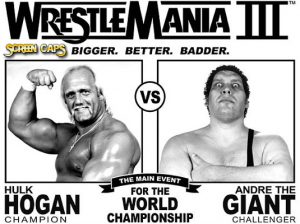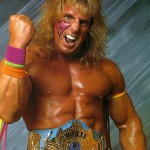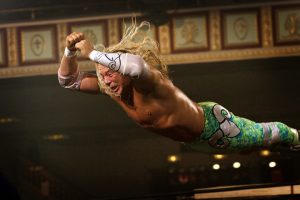
Professional wrestling was a much loved form of entertainment for me and my friends growing up. Looking back at an adult though has made me a bit cynical.
Watching professional wrestling was one of the many pieces of my childhood that made me who I am today. Unlike a cartoon, it was “real” enough for adults to participate in without being compeltely bored, especially when one considers how outlandish and extravagent the characters were. Who couldn’t laugh at Earthquake and Tugboat, the Natural Disasters, or simply some of the pre-match commentary, even today I find it hilarious. I have to give credit to Vince McMahon for his ability to create a live, modern day circus and in the spirit of capitalism, exploit it to the nth degree.
Although it’s been several years, when the film The Wrestler was released, it really hit home on several areas. I realized that I had mentally discarded professional wrestlers. Similar to the toys in my attic, they have been collecting dust and cobwebs for years. The only problem is that each wrestler is obviously a human being. Once us kids, their fanbase, outgrew wrestling, what happens to them? It wasn’t until I watched The Wrestler and also read a few blog articles that I “remembered” professional wrestling.
The plight of professional wrestlers marks a nice transition into adulthood. I think when you are just out of college, the taste of freedom, additional education, and quasi-indepdence leaves you approaching the so called “real world” in a very idealistic mindset. This is not something I suggest should be altered, but as I am in my 30s I tend to have a bit more cyniscism now. It was something I would pick up in adults older than me, and well here I am now, with the same attitude.
The plight of wrestlers provides the perfect case in point. It’s similar to the final years you beleive in Santa Claus, where you know everyone is pretending but you don’t want to ruin the fun of it. Wrestling was no different. Most of us knew it was fake but the thing is, we wanted to beleive it wasn’t because, well, it was entertaining to watch. Keep in mind that we do this whenever we watch a movie or a play, although most don’t think about it.
I bring up wrestling because it represents one of the challenges of being a full fledged adult. Even though many of the moves were staged, what happened behind the scenes was quite real, and frankly sad. Unlike professional atheletes, there is no off-season for wrestlers. Perhaps things have changed, but there didn’t appear to be any type of commission to oversee the health of wrestlers back then. Who knows if it even exists today. The result is that a large percentage of the wrestlers we grew up watching on TV have already died. mostly from cardiac arrest.
This is where the cynical part kicks in. I imagine most of these guys juiced up to quickly get to a physical level that would look good on camera. They would do their stunts and tricks, making good money I suppose. But what future did any of these guys have after wrestling? And the point The Wrestler drives home is who cares about these guys after their fan base gets older? Do pro wrestlers get retirement packages? The term exploitation comes to mind.
As a quick aside, I wish to make clear that one cannot compare professional wrestlers to football, rugby, or other high contact sport atheletes mostly because I assume in the late 80s and 90s the latter received much more extensive and adequate medical treatement than pro wrestlers did.
To take the aside just a little further I can’t speak for today’s professional wrestling. I’ve watched it once or twice and found it dull and far more gory than the wrestling I used to watch. All the wrestlers look no different than the guys I see in those muscle magazines. I will sound like an old man but I preferred wrestlers who had their unique personas, similar to comic book characters. Although I admit some of them were used for propaganda purposes (Colonel Mustafa vs Hogan during the Gulf War) or controversial like the Million Dollar Man and his black “sidekick” Virgil, I don’t think most kids will make the connection. The wrestling I see today just looks like a bunch of meatheads beating and realistically torturing each other. Furthermore, the female wrestlers look no different than strippers with gym memberships. Compare the women to Ms. Elizabeth and I think you’ll get my point. It appears today’s wrestling is targeted at a more mature audience which I think is a shame for children.
Back to the subject at hand, after discovering how many wrestlers have died premature deaths, my initial reaction is guilt. It didn’t seem worth the cheap thrills when as an adult I know what would happen to most of these men. But I’ve learned to set that aside, it’s fruitless to beat myself up for something I wasn’t aware of. So where does that leave me? Well, it’s why I wrote this article. I’m sure many former fans have come to this realization. I think then, the only thing I can do is be grateful for the entertainment these men provided to me as a child and do my best to honor them.
Below is a list (as of this writing) of the professional wrestlers who have died. Source: http://prowrestling.wikia.com/wiki/Category:Wrestlers_who_have_died
A
Trent Acid
Brian Adams
Chris Adams
Adrian Adonis
William Afflis
Shigeri Akabane
Lou Albano
Gary Albright
Ali Baba
Don Anderson
Andre Baker
André the Giant
Ángel Azteca
José Ángel Vargas Sánchez
Rodney Anoa’i
Aristóteles Radamés Coccó Flores
Brad Armstrong
Mike Awesome
B
Giant Baba
J.C. Bailey
Ox Baker
Penny Banner
Johnny Barend
Art Barr
Red Bastien
Paul Bearer
Mike Bell
Chris Benoit
Nancy Benoit
Bestia Salvaje
Bam Bam Bigelow
Freddie Blassie
Bob Kelly
Larry Booker
Brady Boone
Matt Borne
Jonathan Boyd
Steve Bradley
Dino Bravo
Bobo Brazil
Juan Alvarado Nieves
Jack Brisco
Bruiser Brody
Bob Brown
Bulldog Brower
C
Lance Cade
Haystacks Calhoun
Chris Candido
Carl Abs
Emilio Charles, Jr.
Chri$ Ca$h
Donna Christianello
Clarence Whistler
Allen Coage
Al Costello
Shirley Crabtree
Cyclone Negro
D
Brain Damage
Dan McLeod
José Luis Amezcua Díaz
Vincente Denigris
Michael DiBiase
Steve Doll
Donald Lortie
Dr. Benjamin Roller
Chris Duffy
Anthony Durante
E
Earl Caddock
Ed Don George
Edwin Bibby
Conrad Efraim
El Santo
Enrique Llanes
Ernest Roeber
Espectrito II
F
The Fabulous Moolah
Jackie Fargo
Ed Farhat
Eddie Fatu
Reid Flair
Nelson Frazier, Jr.
Uncle Elmer
Fred Beell
Dory Funk Sr.
Doug Furnas
Hiromichi Fuyuki
G
Rodolfo Galindo Ramirez
Héctor Garza
Gene Dubuque
George Steadman
Herb Gerwig
Eddie Gilbert
Jorge González
Terry Gordy
Gorgeous George
Karl Gotch
Dr. Jerry Graham
Mike Graham
Al Green
Johnny Grunge
René Guajardo
Eddie Guerrero
Gory Guerrero
Gus Sonnenberg
Miguel Wenceslao Guzmán Huerta
H
Russ Haas
Tony Halme
Dean Hart
Gary Hart
Owen Hart
Stu Hart
Shinya Hashimoto
Alfred Hayes
Roy Heffernan
Curt Hennig
Gino Hernandez
Elizabeth Heulette
Eustacio Jiménez Ibarra
Brian Hildebrand
I
Isak Rain
J
Don Jardine
Jim Londos
Joe Acton
Joe Blanchard
Joe Stecher
Joey Marella
John McMahon
John Pesek
Grady Johnson
Judy Grable
June Byers
Junkyard Dog
K
Tor Kamata
Chris Kanyon
Lanny Kean
Gene Kiniski
Yasuhiro Kojima
Kotetsu Yamamoto
Wladek Kowalski
John Kronus
L
Ernie Ladd
Carlos de Lucio Lagarde
Evan Lewis
Reginald Lisowski
Mike Lockwood
Carlos López Tovar
Mike Lozansky
Ken Lucas
M
Joseph Magliano
Boris Malenko
Malice
Maria Bernardi
Marianna
Sherri Martel
Andrew Martin
Wahoo McDaniel
Rick McGraw
Roderick McMahon
Vince McMahon, Sr.
Mick McManus
José Díaz Velazquez
Mighty Igor
Tiny Mills
Mitsuharu Misawa
Gorilla Monsoon
Louis Mucciolo
Dick Murdoch
Skull Murphy
N
Abismo Negro
O
Sean O’Haire
Atholl Oakeley
Marcelo Andreani
Oro
Bob Orton, Sr.
P
Jackie Pallo
La Parkita
Paul E. Normous
Miguel Pérez Sr.
Peter Zwissler
David Peterson
Ted Petty
Brian Pillman
Angelo Poffo
Q
Victor Quiñones
R
Rikidozan
Billy Robinson
Buddy Rogers
Buddy Rose
Martin Ruane
Rick Rude
Tony Rumble
S
Dutch Savage
Randy Savage
Angelo Savoldi
Joe Scarpa
Hans Schmidt
Mikel Scicluna
Shane Shamrock
Mike Shaw
Shawn Osborne


Leave a Reply